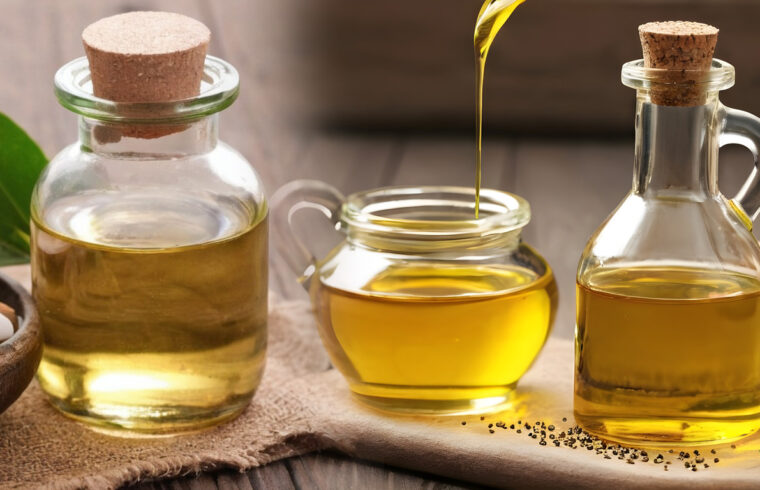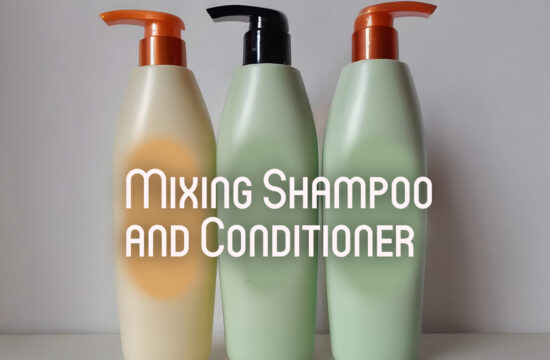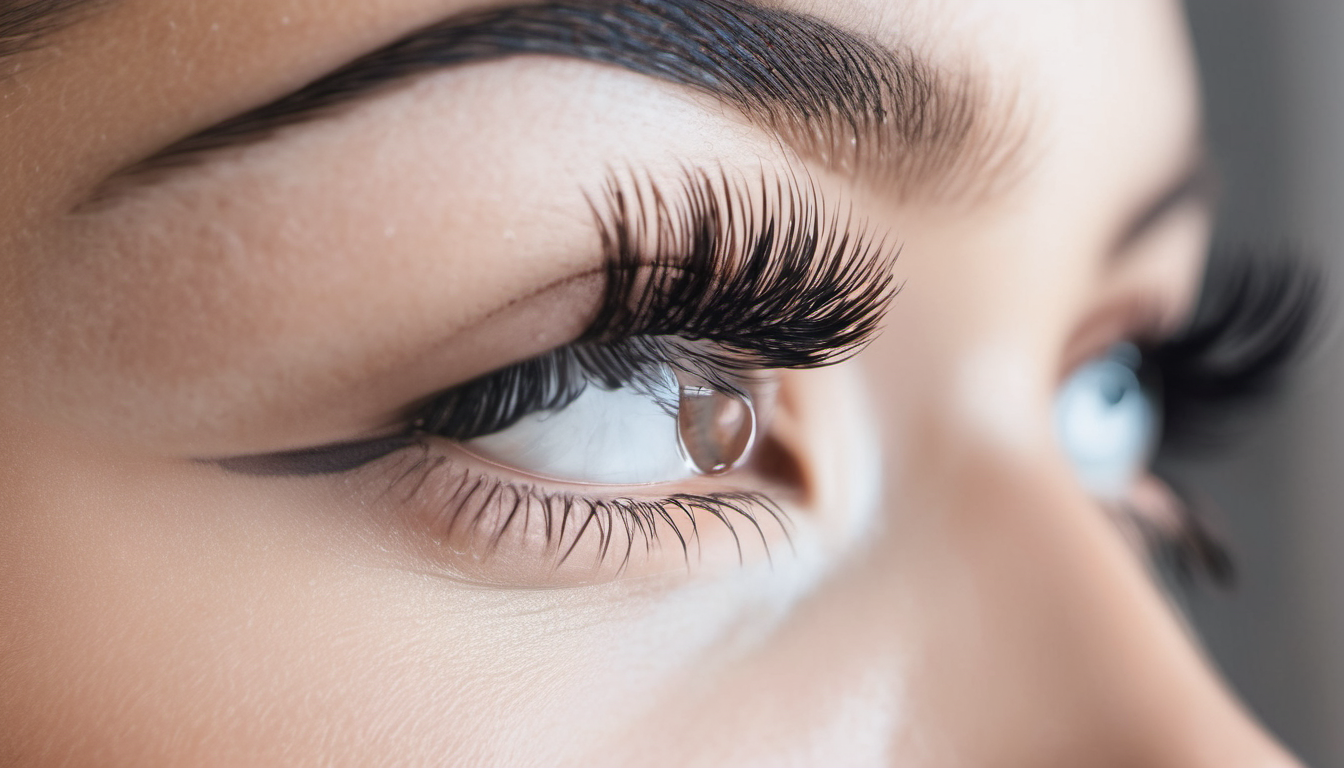Introduction
In the realm of hair care, the perpetual quest for the ideal elixir commences and continues. From the first Ayurvedic herbal treatments down to the latest scientific inventions, people never fail to find the perfect combination of ingredients that can feed and boost their hair growth. Each time this fascinating combination of coconut oil and mustard oil is brought out, it intrigues people. However, is this unusual team effective or are they just being rhetorical? Want to dig deeper into these oils and learn whether they really work together for hair?
Understanding Coconut Oil and Mustard Oil
Coconut oil has been appreciated by many over the years as it is rich in numerous advantages for hair care. Filled with fatty acids and vitamins, coconut oil goes deeper into the hair shafts, saturating and fortifying the hair from its core. Apart from this, it has antibacterial and antifungal properties that are useful in treating scalp issues such as dandruff. Moreover, it is not heavy on hair, hence, making the hair remain soft and manageable.
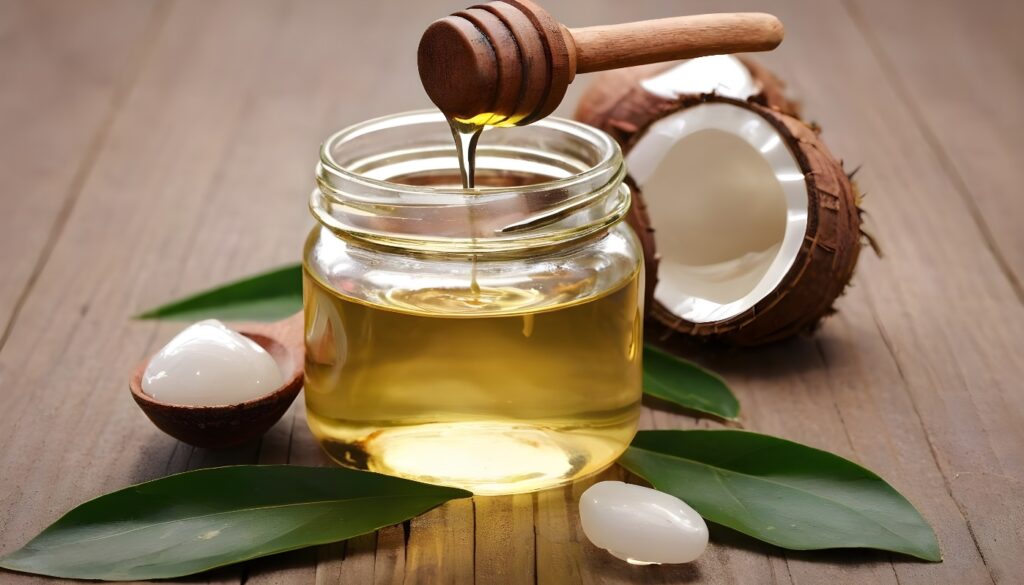
The nutritional content of coconut per 100 grams
- Calories: 862 kcal
- Total Fat: 100 grams
- Saturated Fat: 86.5 grams
- Monounsaturated Fat: 5.8 grams
- Polyunsaturated Fat: 1.8 grams
- Cholesterol: 0 milligrams
- Sodium: 0 milligrams
- Total Carbohydrates: 0 grams
- Dietary Fiber: 0 grams
- Sugars: 0 grams
- Protein: 0 grams
Coconut oil has more saturated fats with a high concentration of medium-chain fatty acids (MCFAs) especially, lauric acid. Known for their health benefits which include improved heart health, increased metabolism, antimicrobial properties and other bonus features. Regardless of its high saturated fat content, studies on the unique effect of coconut oil on cholesterol levels indicate that it may increase HDL (good) cholesterol levels more than the LDL (bad) cholesterol levels.
On the other hand, it should be mentioned that coconut oil can be a very valuable ingredient to a balanced diet when it comes to moderate intake, but withdrawing from excessive consumption is highly preferable due to its high calorific and fat content. Similar to all healthful habit, it is advisable to talk to a healthcare professional or a registered dietitian to handle the accurate amount needed for your specific situation and health concerns.
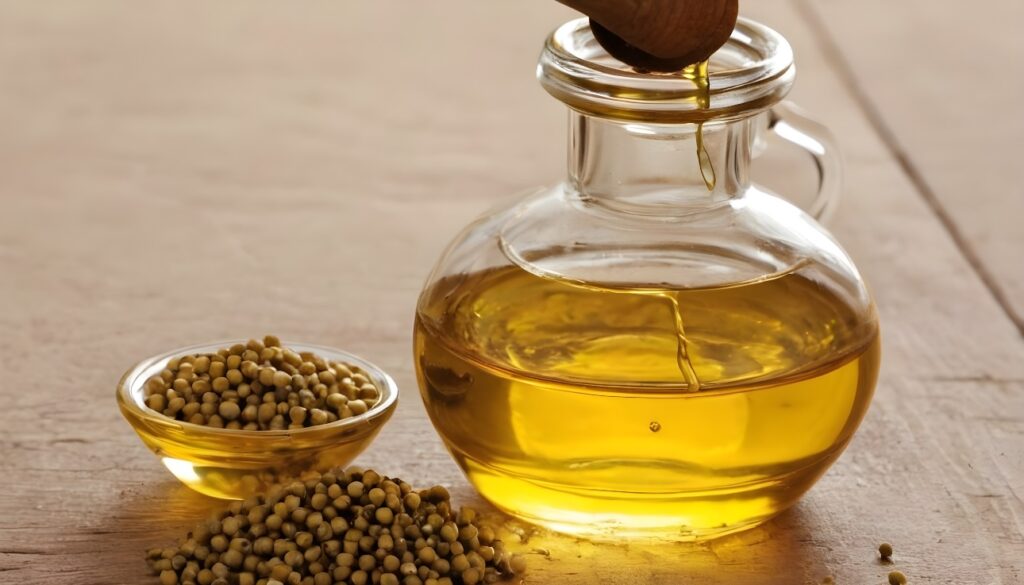
On a different note, mustard oil yields a stiff smell from the seeds of the mustard plant and has different properties from any other. Mustard oil in Ayurveda is praised for its hair and scalp invigorating and constitutive properties; it is an ingredient that quality herbal hair tonics cannot do without. This is thought to increase the blood supply to the deliver oxygen and nutrients. As a result, hair growth is enhanced, and hair loss is avoided. Also, due to it’s high omega-3 fatty acids, antioxidants and minerals content this oil is suitable for moisturizing and shining the hair out.
The nutritional table of mustard oil per 100 grams
- Calories: 884 kcal
- Total Fat: 100 grams
- Saturated Fat: 7.9 grams
- Monounsaturated Fat: 59.3 grams
- Polyunsaturated Fat: 28.2 grams
- Cholesterol: 0 milligrams
- Sodium: 0 milligrams
- Total Carbohydrates: 0 grams
- Dietary Fiber: 0 grams
- Sugars: 0 grams – Protein: 0 grams
One of the main substances that makes up mustard oil is fat. It is enriched with saturated fats and monounsaturated fats including omega 3 and omega 6 fatty acids. These unsaturated fats are of the category of healthy fat and have cardioprotective effects, whereas when they are included in a balanced diet, it can bring a decrease in cardiovascular diseases risk.
Mustard oil’s unique characteristic is erucic acid that is monounsaturated omega-9 fatty acid present in high amount. It is interesting that erucic acid which may possess health advantages is the same one that is suspected by the regulatory agencies of causing undesirable effects on human body following excessive exposure. As a result, moderated using rendered with lower acid has to be consumed and selected varieties with less of erucic acid, especially if it becomes an important part of your diet. Apart from its fat content, mustard oil has sign insignificant amounts of vitamins and antioxidants in it, increasing its total nutritional value. But the undeniable fact that mustrd oil’s nutritional content can be affected in a small way by the processing method used and also by regional variability cannot be overlooked.
Like any other nutrient, it is important to include mustard oil in the diet that is proper and well balanced which will help us to make use of all the possible benefits of these foods whilst also preventing the potential risks. Seeking consultation a healthcare professional or certified dietitian shall create personalized plans on how mustard oil should be used in your diet based on individual health status as well as your preference in the diet.
The Synergy of Coconut Oil and Mustard Oil
One by one, the two types of the oil will undoubtedly provide your hair with an array of health benefits. What, however, will only these two come from when they are mixed? The answer caries in near to their complementary natures.
Coconut oil which is light with percipient moisture-retainment compared to mustard oil, serves an efficient carrier for the powerful nutrients present in mustard oil. When these two (coconut oil and mustard oil), combined together, end-up in producing a mix, which enables in gradually reducing the much stronger scent of mustard oil, for those being extremely sensitive to its fume. What makes coconut oil so great is that it is emollient in nature. Therefore, the popular dryness associated with mustard oil can be offset by that. Consequently, the hair is maintained in its hydrated state.
Moving on, the antibaterrigial properties of coconut oil will provide an additional relief for the scalp when combined with the soothing effects of mustard oil which have a relieving effect on itchiness, inflammation and infections. This set up an overall treatment for scalp problems, which therefore promotes a healthy hair growth almost equally.
Real Experiences with Coconut and Mustard Oil Blend
In order to get a full idea about the purpose of coconut oil and mustard oil mixture in hair taking care, personally, we should evaluate what people say about their daily use of it. Tons of people have revealed positive results using it as a haircare strategy after employing this hybrid.
Samantha, a busy professional, whose hair has frequently looked dry and tangled especially when the winter season comes along, gives her opinion, “I have often struggled with the problem of frizzy and dry hair, particularly in winter.” I have been hearing about mustard oil effectiveness for hair growth and I decided to mix it with coconut and testing it out.The results were remarkable! Not only my hairs were now easily being managed and felt more silky and smooth, but I also recorded a great decrease in hair loss. First of all, the mix of the ingredients turns my hair into a shining crown that I hadn’t been seeing in years.
Similary, James, who is a fitness advokat, explains his path that involved the involvement of coconut and mustard oil mix, “As I sweat more due to my training regimen, I keep having scalp problems, such as itching and seborrhea .” When online researching about effective natural remedies,I found out about the mixture of coconut oil and mustard oil. Using this blend a few weeks consistently, I was able to observe an outstanding improvement in the loal DNA. The itching reduction amounted to the point that I started feeling better about my hair, and it felt stronger and thicker. I’m sure I’ll be going back for more there!” Disclaimer: The text below is a machine-generated translation of the assigned text. Human editing and proofreading will ensure its accuracy and readability.
Expert Opinion and Scientific Evidence
While anecdotal evidence is valuable, yet it shouldn’t be so much focused, moreover, the scientific foundations for the use of coconut oil and mustard oil mix for hair care, must be examined carefully. Dr. Priya Patel, a dermatologist having expertise in hair disorders, has some valuable insights to share on this topic.
This is because both coconut and mustard hair oil can be beneficial to hair care. Replaced with coconut oil that acts as humectants by sealing in moisture and preventing protein loss from the hair. Contrary to other oils, mustard oil stimulates blood circulation and brings the blood to the scalp which in turn can speed up hair growth. The mixture of these oils tends to achieve a synergy that impacts hair at the different levels from hydration, to stimulation of the scalp.
A number of other researches have focused on the specific benefits of coconut oil and mustard oil for hair. The health benefits of eating coconut oil, for instance, are plentiful. One study found that regular consumption of coconut oil can improve cholesterol levels, reduce inflammation, and improve brain function. Another study found that taking a spoonful of coconut oil before meals can help The Journal of Cosmetic Science published a study that stated, from the occurrence of experiments, coconut oil successfully penetrates the shaft of hair and reduces the loss of protein from hair. Thus, it proved to be an effective conditioner for the same in a hair damaged as well as dry condition. Then, the article on the Highlight of International Journal of Pharmaceutical Sciences and Research shows the antibacterial and antifungal effects of mustard oil, aiding in keeping a healthy scalp environment.
Conclusion
In conclusion, coconut oil and mustard oil amalgamation appear to be a useful remedy for the multiple root causes of different hair problems like loss of hair, scalp problems, frizziness and dryness. The nourishing power of coconut oil sweeps the hair from root to tip while the binder effect of mustard oil rises to the top of the scalp to stimulate our follicles for extend strong and healthy locks.
Nevertheless it is necessary to do a skin test before applying a different hair treatment that may cause skin irritation or allergy for people with sensitive skin. Moreover, a new outcome could be obtained depending on the person, thus it is important to remain calm and sustainable in order to create the necessary routine to use this blend.
Ultimately, if you’re looking to revamp the beauty of your hair then the blend of coconut oil and mustard oil is known to be a natural and organic remedy that should be explored. Then what are we waiting for to get started with the one of the oldest hair growth remedies and discover the masked look we have been looking for all this time?


